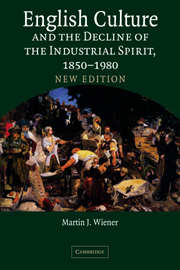Book contents
- Frontmatter
- Contents
- Preface to the first edition
- Introduction to the new edition
- Part I The setting
- 1 The Janus face of modern English culture
- 2 Victorian society: accommodation and absorption
- Part II A world view
- Part III Toward behavior
- Part IV Industrialism and English values
- Appendix: British retardation – the limits of economic explanation
- Notes
- Index
2 - Victorian society: accommodation and absorption
Published online by Cambridge University Press: 07 May 2010
- Frontmatter
- Contents
- Preface to the first edition
- Introduction to the new edition
- Part I The setting
- 1 The Janus face of modern English culture
- 2 Victorian society: accommodation and absorption
- Part II A world view
- Part III Toward behavior
- Part IV Industrialism and English values
- Appendix: British retardation – the limits of economic explanation
- Notes
- Index
Summary
England … owes her great influence not to military successes, but to her commanding position in the arena of industry and commerce. If she forgets this, she is lost.
—Annual Register (1867)Sixty-four years that favored property, and had made the upper middle class; buttressed, chiselled, polished it; till it was almost undistinguishable in manners, morals, speech, appearance, habit, and soul from the nobility.
—John Galsworthy, The Forsyte Saga (1922)“Nine English traditions out often,” an old don in a C. P. Snow novel says, “date from the latter half of the nineteenth century.” This period saw the recasting of British life. Modern British political, commercial, and social institutions are predominantly the creation of Victorian reform and accommodation. Similarly, twentieth-century social values bear the imprint of Victorian arguments. Much of the criticism of mid-Victorian Britain by men like Mill, Arnold, Ruskin, and Dickens, for example, was amplified by social trends under way, and helped shape the outlook of succeeding generations of educated opinion. A distinctive English world view was being formed in the crucible of the mid-Victorian ferment of social ideas. It proved highly suitable to the new upper stratum taking shape at the same time, a stratum produced by the coming together of businessmen, the rapidly expanding professional and bureaucratic classes, and the older gentry and aristocracy. The central institution of the consolidation, the public school, came into its own in this period. From the eighteen-forties, old schools were revived, new schools were founded, and a common ethos began to crystallize. It was an ethos that readily absorbed one side of mid-Victorian social thought, institutionalized it, and propagated it.
- Type
- Chapter
- Information
- Publisher: Cambridge University PressPrint publication year: 2004



